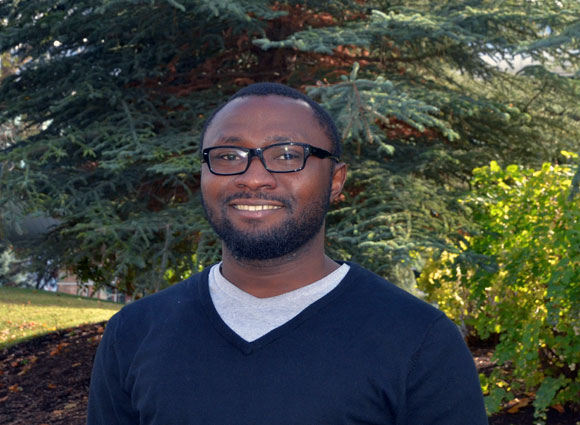
Tolulope Daramola’s research shows integrated forestry-management practices could be beneficial to the degraded forests in sub-Saharan Africa.
UBC student’s award-winning thesis presented at global congress
Tolulope Daramola thinks big. An international student earning his science PhD at UBC’s Okanagan campus, Daramola wants to explore various options to restore degraded lands in sub-Saharan Africa, modelling some of the practices in North America and their applications in the Africa region.
The sub-Sahara, south of the Sahara Desert, is an environmentally diverse region. It accounts for about 25 per cent of the world’s remaining rainforest. However, this forest is shrinking because of the growing population and unsustainable use of the forest resources, consequently leading to land degradation.
Daramola’s home country of Nigeria and 17 other African nations have collaborated to plant a wall of trees across Africa, through an initiative called the Great Green Wall. The massive project comprises planting trees across 14.8-million square kilometres at the southern edge of the Sahara desert, as a means to prevent desertification.
“We need to find better ways to manage the forest sustainably and double efforts to restore the forest that has been lost,” says Daramola. This was the motivation that propelled his master’s thesis, on assessing impacts of nitrogen fertilization of Washington State forests on growth yields. His work was recently recognized by the International Union of Forest Research Organizations (IUFRO), with Daramola’s thesis awarded the 2014 Student Award for Excellence in Forest Sciences at IUFRO’s World Forestry Congress in Salt Lake City in October.
Daramola wants to build on the success of his master’s work towards his PhD research. He plans to develop a matrix management model that will connect the important components of sustainability in forest management in sub-Saharan Africa, by integrating socio-economic and ecological interactions of forest ecosystems management towards sustainable development.
Forest management is a complex issue in Africa. Balancing economic needs and environmental concerns is a difficult task in a region where 65 percent of the population derives its livelihood from the forest.
“Our current forest management system has proven ineffective, because of the inherent gap between science-policy interface and local knowledge and needs,” says Daramola. Such policies do not address fundamental issues associated with forest loss. Before any policy can be effective, it has to place people at the central of it objectives, he says.
“Tolulope has defined an interesting and timely research project, which could make a very real difference on the ground,” says Daramola’s supervisor, Assoc. Prof. Kevin Hanna of the Irving K. Barber School of Arts and Sciences. “Given the looming impacts of climate change and the implications for regions such as sub-Saharan Africa, this is the kind of work we will need more of.”
Once his PhD is complete, Daramola plans to return to Africa, using his knowledge to benefit his people.
“My goal is to carry out a research that is applicable on the ground, something new and unique, something that will solve problems and address some of the contemporary issues that is undermining development in Africa,” he says.
—30—